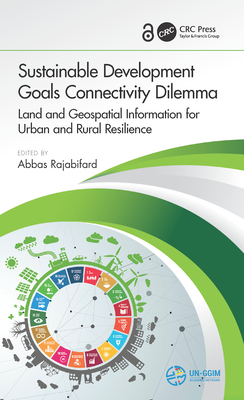Sustainable Development Goals Connectivity Dilemma (Open Access): Land and Geopsatial Information for Urban and Rural Resilience
Rajabifard, Abbas
- 出版商: CRC
- 出版日期: 2019-07-30
- 售價: $4,040
- 貴賓價: 9.5 折 $3,838
- 語言: 英文
- 頁數: 376
- 裝訂: Hardcover - also called cloth, retail trade, or trade
- ISBN: 0367259354
- ISBN-13: 9780367259358
海外代購書籍(需單獨結帳)
相關主題
商品描述
The Open Access version of this book, available at https: //doi.org/10.4324/9780429290626, has been made available under a Creative Commons Attribution-Non Commercial-No Derivatives 4.0 license.
Large-scale migration from rural to urban areas, and between countries, affects sustainable development at local, national, and regional levels. To strengthen urban and rural resilience to global challenges, Sustainable Development Goals Connectivity Dilemma: Land and Geospatial Information for Urban and Rural Resilience, brings together leading international geospatial experts to analyze the role of land and geospatial data infrastructures and services for achieving the United Nations' Sustainable Development Goals (SDGs). While the goals outlined in the 2030 Agenda have been longstanding aspirations worldwide, the complexity and connectivity between social, economic, environmental, and governance challenges are changing with large-scale urbanization and population growth. Structured in 5 parts, the themes and objectives of the book are in line with the critical challenges, gaps, and opportunities raised at all UN-GGIM events and UN-GGIM Academic Network forums. Through the different perspectives of scholars, industry actors, and policy-makers, this book provides interdisciplinary analysis and multisectoral expertise on the interconnection between the SDGs, geospatial information, and urban and rural resilience.
Sustainable Development Goals Connectivity Dilemma: Land and Geospatial Information for Urban and Rural Resilience is an essential reference for researchers, industry professionals, and postgraduate students in fields such as geomatics, land administration, urban planning, GIS, and sustainable development. It will also prove a vital resource for environmental protection specialists, government practitioners, UN-GGIM delegates, and geospatial and land administration agencies.
Features:
- Introduces a holistic and new approach to sustainable development
- Brings together social, economic, and environmental dimensions of sustainability
- Highlights the significance and the role of geospatial information in sustainable development
- Examines urban and rural interdependencies in the context of strengthening resilience
- Written by experts with diverse academic and professional backgrounds who examine connectivity and develop strategic pathways











